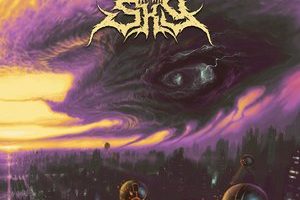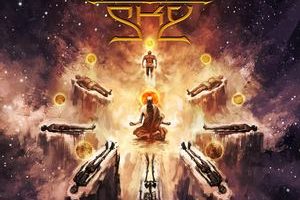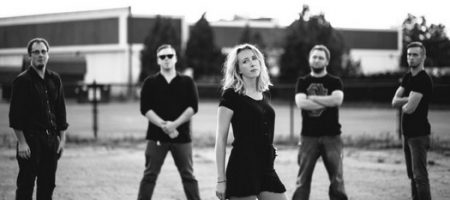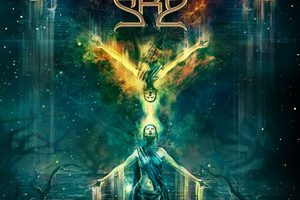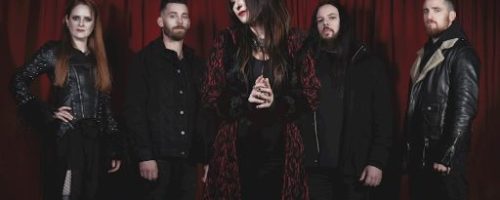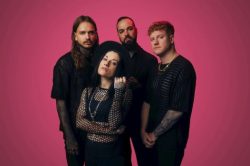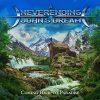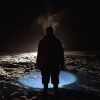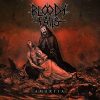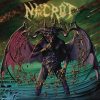Burial in the Sky – Expanding Extremity
Thursday, 28th June 2018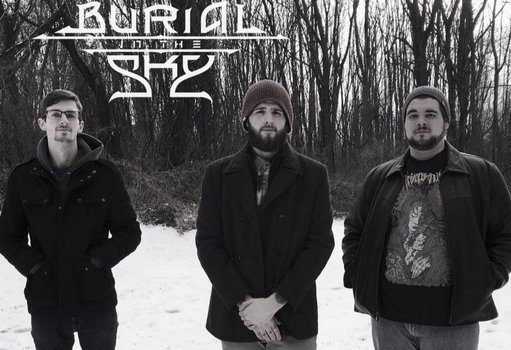
It’s an exciting time for tech death metal if you are in seek of forward-thinking, progressive material. Not simply the ‘tech for tech’s sake,’ but those who are looking to advance the genre forward. We’ve seen some great leaps within even the last five years, with bands moving into more emotive and atmospheric territory. Burial in the Sky is the next band in line attempting to push the metal world forward, with their take on progressive, technical, and even psychedelic waters.
Creatio et Hominus is the band’s latest effort, and successfully merges death metal brutality with esoteric ambience. They employ a number of outside the box instruments to aid them in their quest – everything from saxophone and piano to percussion – and are rightly gaining some ground. We met up with the entire band before their cd release party at Darkside Records in Poughkeepsie, NY to talk about the new album, refined line-up, carryover buzz from Rivers of Nihil’s latest, and more.
Dead Rhetoric: Where’d the idea for the release show come together – this is a bit of a drive for you guys?
James Tomedi: It was a while ago, and we were supposed to play a show on record release day, and Sam [Stewart] was already in the band, so I was super excited about that. It was in New Jersey, and it didn’t pan out due to members changing. This [Darkside Records] seemed like a great place. The owners are super awesome people, so we said “Hey, why not?” We didn’t know if it was going to be a small gathering of people or friends, which it will probably end up being, but we are stoked about it.
Dead Rhetoric: There’s more of a fleshed out line-up now. How did the current line-up end up coming together?
Sam Stewart: I joined the band in 2016 and it was just Will [Orkonglis] and James at the time. Will left because he became and adult and real life happens. Metal is not real life – that’s a harsh reality [laughter]. Zach [Strouse] and I were buddies – we went to college together and we played in a band called Burn the Empire. So we got Zach on board. We had a revolving door of vocalists for about 6 months. Jorel [Hart] is a good friend of ours. He does the vocals on the record [Creatio et Hominus] but he is not full time. I feel like we have locked things in place.
Tomedi: Yes, especially with [the three of] us – we have a pretty cool thing going now.
Dead Rhetoric: Do you feel that you’ve grabbed some extra attention due to the Rivers of Nihil connection with Zach’s saxophone?
Tomedi: Yeah, I think it’s the running thing with most of the sites that are covering us right now. It’s how awesome he is, so we are just going to keep writing with the awesomeness of Zach and keep riding those coattails [laughs].
Zach Strouse: A lot of places, like if you check out “The Pivotal Flame” single on YouTube, it’s like, “Featuring Rivers of Nihil sax player” and it’s right out there. But it’s cool though, it’s a good push. I’m obviously not getting royalties from Rivers, because why would I? It was more of an exposure thing and I am using that PR to push us forward. We are all using it like, “Remember that really good metal album that just came out? That sax player is in our band, and does other stuff too!”
Stewart: Zach and I have known Brody [Uttley] for a while, because he produced the Burn the Empire stuff back in the day. So we have been tight with him – he’s a good dude. All the guys in Rivers are great guys and musicians, and they are representing the scene well – the changes in tech death and the way it’s all going, I think Rivers of Nihil is a good representation.
Dead Rhetoric: In regard to those shifts within tech death, what type of emotions were you trying to tap into with the new material?
Tomedi: When we write, in general, we’ve always wanted to convey some sort of subset of emotions rather than just throwdown all the time. That has kind of lost its luster over the years. It’s still awesome, and we love bands that do that, but we wanted to reach out a little bit. We like musicality and reaching a bit further.
Stewart: Like we were saying with bigger bands with tech death, I think fans are getting more into deeper experiences. They want the surface approach to be good the first time they listen to a band, but when they come back to it, they want to find something else each time. That’s why bands like Rivers and Between the Buried and Me are really listenable, because every time you listen to a song, you hear something you didn’t hear last time. Or there’s a connection in lyrics to the song or something. We just wanted to start creating things that had that sort of depth to them. Someone listens to it the second time and they find a lick they didn’t hear the first time and it changes their perception of the song.
Strouse: Or even emotionally. Going back to Rivers, it’s such a monumental breakthrough musically, in the extreme metal scene, with the momentum of the album being about death and sadness. All of the lyrics and riffs are just destructive but have parts that rip your heart out. You listen to it and you are like, “Man, I am sad!” It’s like mature emo – instead of going into your room and wanting to write poetry, you want to go out and punch someone in the face.
Stewart: You want to stand in the rain under a streetlight and just look down the distance as a car drives away [laughter]. When I hear “The Silent Life,” I just want to fall into the abyss.
Tomedi: That’s what we want to do. We want people to feel what we are feeling. To convey that, you have to add different textures and layers into your music that weren’t there before. Back when you saw us at the Monarchy release show, a lot of what we were doing was just tech. That was the driving force – Necrophagist was THE thing.
Dead Rhetoric: Using outside the box instruments – where’d the idea come from and how do you decide where to implement them?
Stewart: We used some auxiliary percussion – we used a cabasa, bongos, congas, a shaker – we were at Sine Studios in Philadelphia where I do my drums with Taylor Kogut. All of those instruments I saw in the studio and I wanted to put them on tracks to see how they would sound. I also did a cymbal scrape. We knew we were going to have sax with Zach in the band.
Tomedi: We talked about auxillary instruments like that for a while. The piano was also in the moment. I loved that melody in “Nautilus’ Cage” so I really wanted to restate it in an easier, softer fashion. To have it as a guitar was one thing, but the change to piano would really hit home.
Stewart: I think that’s where most of our best ideas come from. The whole idea of “Nexus” was in the moment.
Tomedi: I wrote that song in a very relaxed, chill environment just throwing ideas around. I get really involved in trying to find soundscapes. Those relaxing, ethereal kinds of things. It made sense with him on sax to be able to incorporate that in one way or another. The stuff like the mandolin, kalimba, and slide – I’m a huge psychedelic ‘70s fan: Pink Floyd and everything else. That stuff comes very naturally to me in music. It’s very in the moment, after the song is there. It’s like, this could use a little bit of something more – a lot of that stuff is on “The Pivotal Flame” and it turned out very well.
Dead Rhetoric: Jorel, what is your role with Burial in the Sky?
Jorel Hart: I’m currently not in any band. I’m trying to do stuff like this – they [Burial in the Sky] had an album ready to go and wanted vocals on the album. I’m trying to work more into that field. With touring, I just don’t have the time or money to do it right now. I’m trying to utilize what talent I have and stay local, but also get to do a few live things.
Dead Rhetoric: Do you think there’s potential for more psychedelia in your music?
Tomedi: It’s hard sometimes, depending on what you are trying to do or present in psychedelic music – where it came from, in that ‘60s/’70s era where it came from and sort of snowballed and became a thing. You have bands like 13th Floor Elevators or Pink Floyd – or even mid/late era The Beatles. You can only go so far with metal without having this sense of urgency. Metal always has a sense of urgency, so to incorporate that sort of element sometimes gets choppy. I think, if done correctly, it can only go further. Which is what we intend to do.
Stewart: Psychedelic is sort of a first term for it. None of the three of us who really listen to metal super strictly. Most of our influences are from outside genres, which will bring in those slower, less textured parts.
Dead Rhetoric: What’s tough as an extreme metal act that’s growing, and sits a bit apart from what many are doing in the scene?
Stewart: Always having to have something backlined or having something in the background. To convey our sound we wouldn’t be able to do it live without that.
Tomedi: I feel that we have to wait. We have to ride the wave. Bands are all becoming more musical. The bands we are playing with today are super musical and structured. I think once more…doesn’t the new The Faceless have flute on it? As more and more bands do the more mature music, the easier it will get. Record stores like this, and just getting the exposure. I think metal is on it’s way to becoming more of a legitimate artform, and as we progress, more and more it will become easier. People will look back on our older stuff and “get it.” This summer is going to be the blossoming of it, I hope.
Hart: I think people are less afraid of metal now. There is more acceptance of what’s out there, since the last 30 years it has been being shoved down people’s throats. After you get that prep going, the maturity level is coming through in the music, and you are seeing it in a lot of the bigger bands.
Dead Rhetoric: What do you think you are going to expand upon in the future, and what plans do you have for the summer and beyond?
Tomedi: We are definitely trying to push forward with the sound of this record. You are going to hear it more and more in depth, even writing-wise. We are all on the same page and know what we want, as far as the sound goes. We want to be able to push that boundary as well. Other bands are doing it well, and we want to be a part of it.
Stewart: There was a review that labeled our album as ‘death metal that makes you smile.’ I was like, “Hell yeah!” If that’s the vibe we are giving, then I’m all in. That’s what we want. It’s positive.
Strouse: Give the person next to you a big ole hug!
Tomedi: We like to hug people, so it’s good. But what we have in the future – we have a show in July with Rivers of Nihil [in Reading, PA]. We are going on tour with Crucial Rip and at the end of it is the Rivers of Nihil show. Before that, we play with The Earth and I, who are proggy and have a female singer.
Strouse: Also on the bill, that we just confirmed this week, is Nights of Malice. They are a Jersey deathcore band. One of the guys that I work with at the store I teach saxophone lessons is the drummer, so I had that connection. I went to high school with the vocalist as well. They are all just local guys.
Tomedi: It’s going to be a fun summer. When we are all available, the writing will pick up again. We want to keep the momentum going.











